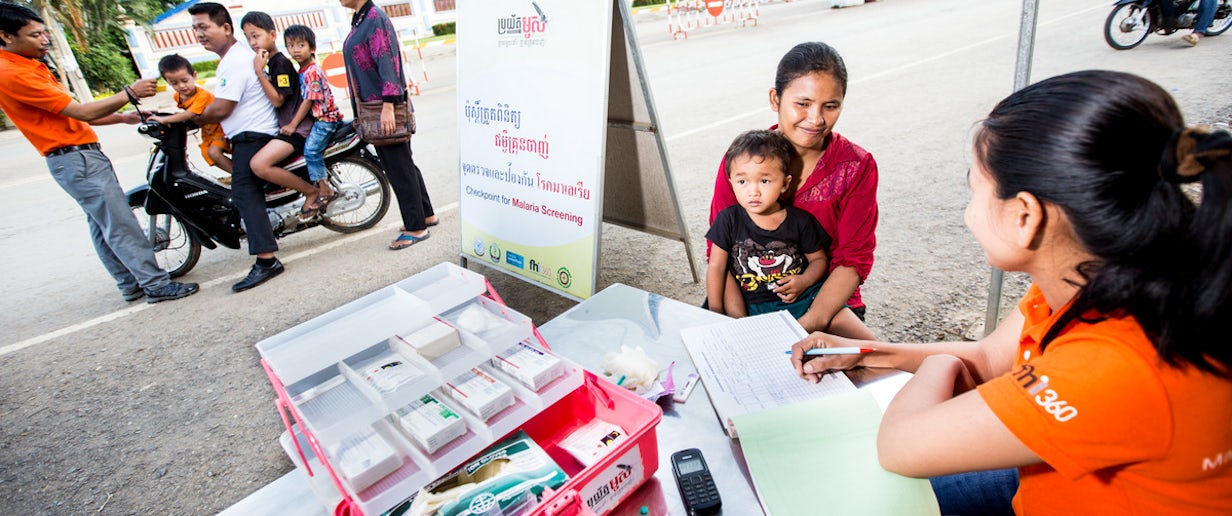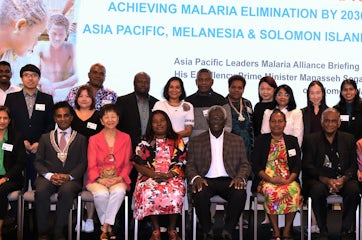A big step towards malaria elimination: Thailand approves new radical cure for vivax malaria
by •

Malaria screening checkpoint in Thailand © The Global Fund, John Rae
Thailand is the first country in Asia to register tafenoquine, a new single-dose radical cure for relapsing malaria. The important milestone was announced in March 2020.
In many countries in Asia-Pacific, Plasmodium Vivax (P. vivax) or relapsing malaria continues to jeopardize the progress and investments made to eliminate malaria at country and regional level, as well as threaten people’s lives. In 2018, approximately 60% of the malaria cases in the Greater Mekong Subregion were P. vivax or a dual infection with both P. vivax and P. falciparum. [1] Accelerating access to radical cure for vivax is critical because, currently, vivax accounts for 85% of all malaria cases in Thailand.
Malaria parasites have the ability to lie dormant in a person’s liver and can be transmitted from infected humans to mosquitoes, even before the symptoms develop in those infected. This poses a complex problem of a resurgence of malaria, especially in areas where control efforts are not sustained.
Until now, a 14-day course of treatment was required to target the dormant form of P. vivax malaria. However, completion of the 2-week course is uncertain, particularly for those most at-risk populations in remote areas where regular follow up is a challenge.
Tafenoquine (TQ) offers a radical single dose cure able to kill the parasite at the dormant liver stage and has the potential to improve adherence as compared to a 14-day course of treatment with Primaquine. As for other radical cures, the risk of haemolysis in G6PD deficient patients warrants a G6PD test prior to administering the treatment.
Through the Indo-Pacific Regulatory Strengthening Program, Australian Therapeutic Goods Administration (TGA) and the Thai Food and Drug Administration (FDA) have worked in partnership to fast-track the regulatory review process of the drug in Thailand. This collaboration was born out of the Regulatory Strengthening Partnership for Malaria Elimination (RRPME) in 2018, led by the Asia Pacific Leaders Malaria Alliance (APLMA), the World Health Organization and other partners. Registration of tafenoquine will now allow the Directorate of Vector-Borne Diseases to implement a study on the feasibility of administering tafenoquine in concurrence with glucose-6-phosphate dehydrogenase (G6PD) testing using new point-of-care G6PD quantitative devices[2] to determine whether it might be of use as the country strives for malaria elimination.
Advocacy tools such as the ‘Roadmap for introduction radical cure for P. vivax’ and ‘Access tracker’ have also been developed by APLMA in consultation with Thailand’s Division for Vector Borne Diseases (DVBD), Thai FDA, Medicines for Malaria Venture and the Australian TGA – to map out the process and timelines for the roll-out of tafenoquine and how it will be scaled to reach patients, in time for Thailand to meet its 2024 elimination goal.
Tafenoquine expedited review and approval is a huge step forward for Thailand. The Greater Mekong subregion could benefit, as it approaches the 2030 end goal by which to eliminate the disease from the region. As many countries do not have access to this medicine yet, the approval and subsequent roll-out of tafenoquine in Thailand will be an important lesson not just for the country but for the rest of the region.
[1] World Health Organization, World Malaria Report 2019
[2] Tafenoquine needs to be rolled out safely and only in patients with confirmed normal G6PD enzymatic activity (≥70%) as Tafenoquine may cause haemolysis in individuals with G6PD deficiency.




